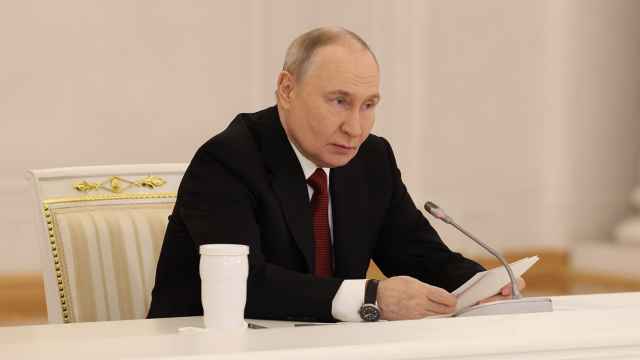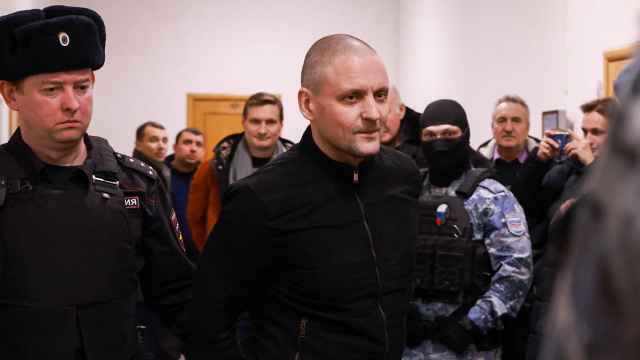The Canadian dollar has been added to international reserves and may increase in coming months, Alexei Ulyukayev, first deputy chairman of the Central Bank said Wednesday.
“We have recently begun investing in assets denominated in the Canadian dollar,” Ulyukayev, 54, said in an interview yesterday in Moscow. “So far, the amounts are very small, but there’s perhaps potential for increasing our holdings.”
Russia aims to diversify its reserves, the world’s third biggest, and promote the use of regional currencies in international trade and finance to reduce risks posed by the dominance of the U.S. dollar. The Central Bank has said it also plans to increase gold holdings and may consider including other currencies, including the Australian dollar.
The reserves comprise 47 percent U.S. dollars, 41 percent euros, 10 percent British pounds, 2 percent Japanese yen and a small amount in Swiss francs. The Central Bank has reduced the U.S. currency from 50 percent of the total in 2006, when euros accounted for 40 percent, with yen and pounds accounting for the rest. Russia’s reserves totaled $495.7 billion as of Nov. 12.
The Canadian dollar’s share of Russia’s reserves is so small it hasn’t yet affected currency allocations, Ulyukayev said.
“Within several months we may be able to speak about more substantial volumes and any changes in the structure” of the reserves, he said.
Canada’s dollar, dubbed the loonie after the aquatic bird on the country’s dollar coin, has gained 4.2 percent against the greenback this year on increasing demand for higher-yielding assets and raw materials. Commodities generate about half of the country’s export revenue.
The Central Bank is considering including the Australian dollar “in the list of currencies allowed for reserve allocation,” Ulyukayev said. Australia’s currency, also linked to commodities, has risen 9.6 percent against the dollar this year.
“We are considering several other currencies, but we are looking at them more in a theoretical sense than a practical one,” Ulyukayev said.
There is growing support for a new global currency system that is less reliant on the dollar as a reserve currency, South African Finance Minister Pravin Gordhan told reporters in Pretoria on Nov. 15. While the dollar’s position “‘has been shaking,” there is no other currency that would serve as an alternative, Japan’s Prime Minister Naoto Kan said Nov. 19.
The greenback will remain the “leading” global reserve currency even as new rivals appear, Ulyukayev said.
“There is competition, and it looks like it will intensify among currencies that play the role of global and regional reserve currencies,” Ulyukayev said. “I think the dollar will be leading in this competition,” given the United States' share of the global economy and its highly developed financial markets.
President Dmitry Medvedev renewed his drive to reduce the dollar’s dominance and transform Moscow into a global financial hub, promoting the ruble as a reserve currency in his speech at the St. Petersburg Economic Forum in June.
The ruble has become a “regional reserve currency for the countries of the former Soviet Union” and nations with “a traditionally large share of trade with Russia,” Ulyukayev said. “This is seen in increasing volumes of settlements in rubles” and ruble-denominated eurobond issues by borrowers outside Russia, he said.
China started allowing the yuan to trade against the ruble on Nov. 22 to help internationalize the Chinese currency. Prime Minister Vladimir Putin said this week that the yuan would start trading on Russian exchanges next month as the two countries use local currencies in bilateral trade.
The Chinese yuan will become a global reserve currency once it becomes fully convertible, Ulyukayev said. The yuan is allowed to trade 0.5 percent on either side of a daily fixing rate to the dollar as set by the Central Bank.
“There is a discrepancy between China’s share of global trade, GDP and the lack of convertibility” of its currency, Ulyukayev said. “If this discrepancy will be overcome quickly, the yuan will enter their ranks.”
Brazil’s real is unlikely to become a global reserve currency in the “near future,” he said.
A Message from The Moscow Times:
Dear readers,
We are facing unprecedented challenges. Russia's Prosecutor General's Office has designated The Moscow Times as an "undesirable" organization, criminalizing our work and putting our staff at risk of prosecution. This follows our earlier unjust labeling as a "foreign agent."
These actions are direct attempts to silence independent journalism in Russia. The authorities claim our work "discredits the decisions of the Russian leadership." We see things differently: we strive to provide accurate, unbiased reporting on Russia.
We, the journalists of The Moscow Times, refuse to be silenced. But to continue our work, we need your help.
Your support, no matter how small, makes a world of difference. If you can, please support us monthly starting from just $2. It's quick to set up, and every contribution makes a significant impact.
By supporting The Moscow Times, you're defending open, independent journalism in the face of repression. Thank you for standing with us.
Remind me later.





